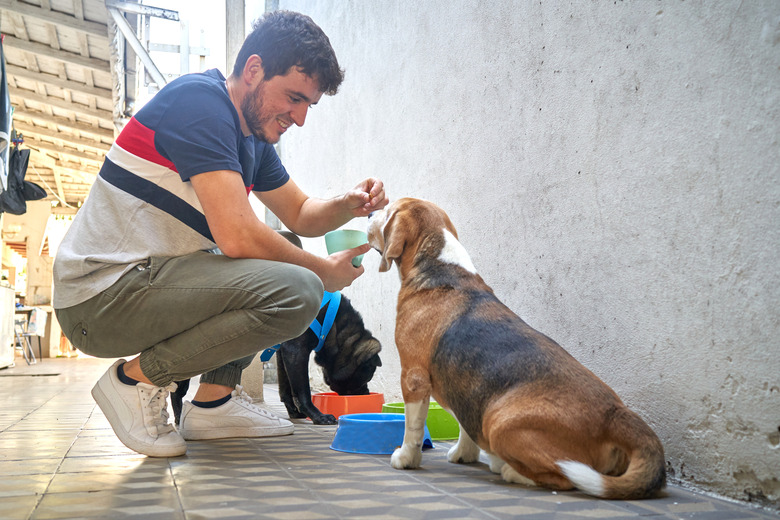What Causes High Ketones In A Canine?
A dog with a high level of ketones in their urine suffers from a condition known as ketonuria, usually resulting from a buildup of these substances in the dog's blood. A ketone is a type of acid, and if allowed to accumulate in the blood, it can potentially lead to fatal conditions, such as electrolyte abnormalities and ketoacidosis.
Cause of high ketones in dogs
Cause of high ketones in dogs
Starvation and diabetes are the two most common causes of high ketones in dogs. A dog's body breaks down the food that they eat into sugars, also called glucose, that the cells of the body use for energy. The dog's pancreas then produces the hormone insulin to regulate the amount of glucose that the body will absorb.
If there is an insulin deficiency making it difficult for glucose to be regulated, typically due to chronic diabetes mellitus, the body breaks down alternate sources of fuel for its cells. A dog's body that is starved of nutrition will do the same.
One of these sources is the fat stored in the dog's body. When the body breaks down this fat, it produces as a byproduct toxic acids known as ketones. These ketones then build up in the dog's urine and blood, leading to ketoacidosis.
How do I diagnose high ketones in my dog?
How do I diagnose high ketones in my dog?
Always consult an experienced veterinarian regarding the health and treatment of your pet. A dog suffering from high ketone levels in their blood and urine may exhibit some symptoms that seem similar to other conditions. There are other serious illnesses, such as Cushing's disease, that have similar symptoms, so an early diagnosis is important.Look for symptoms of high ketones in dogs like the following:
- weight loss
- vomiting
- increased thirst
- decreased appetite
- increased urination
- lethargy
- low body temperature
- yellowing of the skin and gums
- the dog's breath may also have a sweet, fruity smell due to the presence of acetone caused by ketoacidosis.
To accurately diagnose high ketone levels and ketoacidosis in your dog, a veterinarian will take blood tests and a urinalysis, which will also check your dog's blood glucose levels. So, be prepared to provide your veterinarian with a urine sample from your dog.
Treatment and management of high ketones in dogs
Treatment and management of high ketones in dogs
Depending on the dog's physical condition, hospitalization may be required to monitor their condition and administer intravenous fluids to prevent and treat dehydration. The veterinarian will administer insulin therapy to reduce the levels of ketones and glucose in the blood and urine. Potassium supplementation may also be necessary to prevent hypokalemia, a condition that can accompany ketoacidosis.
Treatment for diabetes mellitus is ongoing, and once at home, you will need to administer insulin through an injection and test the diabetic dog's blood glucose levels with dipsticks or test strips as directed by your veterinarian.
How do I diagnose diabetic ketoacidosis in my dog?
How do I diagnose diabetic ketoacidosis in my dog?
Diabetic ketoacidosis, also known as DKA, is caused by hyperglycemia. It can be triggered by stress, illness, trauma, or failure to give your dog insulin for diabetes. If glucose levels are not restored and the dog's electrolyte balance is disrupted, abnormal heart and muscle functions may occur. Concurrent diseases that can contribute to high ketone levels include cancer, pancreatitis, urinary tract infection, asthma, and kidney or heart failure.
To diagnose ketoacidosis, your veterinarian is likely to conduct neurological, cardiovascular, and respiratory assessments to decide if emergency treatment is required. When a dog has a diagnosis of diabetic ketoacidosis, the veterinarian's priority will be to stabilize the dog, so they will implement fluid resuscitation and insulin therapy and treat any electrolyte abnormalities.
Each dog will require a tailored treatment plan following discharge, which will include ongoing monitoring, appropriate nutrition, maintenance fluid therapy, insulin, and antimicrobial therapy. If the ketoacidosis was due to starvation, your veterinarian will provide guidance on feeding the dog a nutritionally complete dog food in smaller amounts.
The survival rate to discharge from hospitalization is 70 percent. Ongoing monitoring and care will be required to manage the health of any dog diagnosed with ketoacidosis. There is a 7 percent risk of recurrence in dogs.
In summary
In summary
Starvation and canine diabetes are the two most common causes of high ketones in dogs. Ketones can build up in the dog's blood and urine, resulting in ketoacidosis, which requires emergency care by a veterinarian. Symptoms include weight loss, lethargy, and an increase in thirst along with a reduction in appetite. Blood sugar and urine tests will allow your veterinarian to quickly provide treatment that could save your dog's life.


